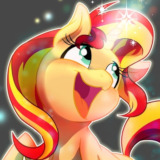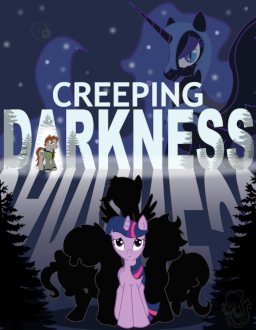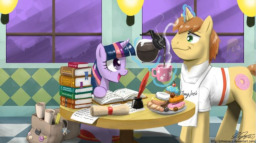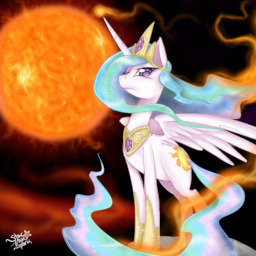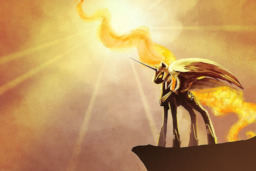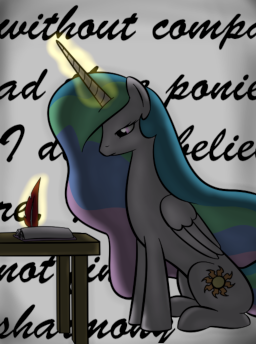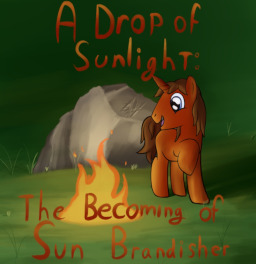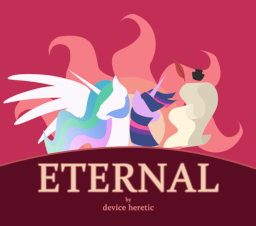Vault Stories: Part II – Constellations to Eternal · 7:41pm Jun 12th, 2018
Constellations | The Conversion Bureau | Creeping Darkness | A Cup of Joe | Cupcakes
Dancing on Silver Strings | Daylight Burning | Diary of a Ruler | A Drop of Sunlight | Eternal
Some lessons I’ve learned preparing this set:
1. Write better notes so you don’t have to reread the story.
2. Sometimes it’s really hard to find Suggested Reading.
3. Appreciate all the folks who take the time to write reviews, it’s bloody hard.
4. "Nah. Maybe later" is best applied to Appledashery, and maybe not blog post series.
Anyways, thoughts on ten more Vault stories coming up next:
11. Constellations by The_RPGenius
Vault Interview
Constellations is an old 2011 Luna story about Luna finding another pony who appreciates her night besides Celestia. It does a fairly good job of avoiding the excessive angst that such stories usually contain. Luna still broods a little about how modern day ponies view her night sky, but instead of taking it in a self-pitying direction, she strives to be a princess who loves and supports her little ponies, an effort that is made a little easier by the “new” custom of wishing upon a star.
It’s a nice enough story, with hardly anything that could be considered a serious fault (aside from a few small, rather strange moments when the narrator breaks the fourth wall). On the other hand, there’s not very much that really makes the story unique, either. It doesn’t manage to surprise or elicit any powerful emotions, and indeed the story feels rather mechanical. The events in Constellations all feel very passive and, while not inappropriate in a slice of life story, don’t really feel like they serve a grand purpose. Luna is sad. She learns Twilight likes to map the stars and pay close attention to detail. Luna feels appreciated.
Given its short length, I think Constellations could serve as a decent “palate cleanser” between larger, more dramatic stories, but even then there are probably better options.
Rating: 2/5
Suggested Reading: Slice of Life/Fluffy Luna
Moonstruck by Sharkrags
In many cases, Moonstruck is a very different story from Constellations, such as the fact that it’s a 2nd Person (!) and a Human (!!) story, but the essence of it—Luna finding a creature that appreciates her night is the same. It’s a wonderful little story that really exceeds your expectations.

12. The Conversion Bureau by Blaze
Vault Interview
Oh boy, it’s the first “Classic” story entered into the Vault (”Classics” are stories that entered the Vault not because RBDash47 was especially impressed by their writing, but because of the impact they had on the fandom and its fanfiction community). While as its own story The Conversion Bureau is not especially loved, its ideas are responsible for one of the largest fanfic universes on the site. The Conversion Bureau is in a sense a Humans in Equestria story, but it twists the narrative by 1) having Equestria inhabit an actual island on Earth, and 2) force all humans who wish to live in Equestria to undergo ponification with the titular Conversion Bureau. Ignoring all the baggage associated with Human in Equestria/Pony on Earth stories, the premise is actually very interesting and has a lot of philosophical implications that could be explored by a skilled writer.
Sadly, the original story does not do its grand potential justice. The writing is amateur and not especially interesting, but the larger grievance is how it treats the duality of human and pony society with such heavy-handed brushstrokes that any interesting questions the setting may have asked are quashed before they can even begin to develop. Humans are vilified and ponies are glorified without any nuance. When one of the story’s few specific examples of human society is this:
He noticed a grainy, black-and-white picture of a rather greasy, mean-looking human holding his arm straight out, as if he was giving some form of salute.
Well, you’d have to be a serious misanthrope to think TCB is treating humanity with the delicacy it deserves to make a story like this really work.
Keep in mind Cold in Gardez’s golden words: “Stories about ponies are stories about people.” When you force a dichotomy between the two and ignore or eliminate any of the overlap, all you are left with are husks (and only Hollow Knight can make a good story out of that :V). Of course, note that this works in both directions: a heavy-handed “Humanity, fuck yeah!” is no better, and any story avoids these two traps may be applauded.
Rating: 1/5 (DNF 4/12)
When I first read this story a few years back, I actually managed to read everything that was written. I’m not sure what being unable to get even half as far this time says about how my tastes and standards have changed. Regardless, I would recommend any exposure to the original Conversion Bureau story be limited to learning its premise. If the concept still interests you, go dive into the sides stories written by other authors.
Suggested Reading: TCB-verse
Railroad Seven-Three by Defoloce
Defoloce has a wake of making his settings come alive. There’s a certain bit of unavoidable hamminess in the TCB universe, but Railroad Seven-Three provides a dreadfully (in the best possible sense) authentic portrayal, both through the worldbuilding and the characters that live in it, of this collision between two worlds. It furthermore has some of the best pacing I’ve seen on this site: every chapter hits hard and pushes the narrative further in unique and exciting ways. This is the sort of story that makes The Conversion Bureau worth reading; one that realizes the potential that this setting contains.
13. Creeping Darkness by Pen Stroke
Vault Interview
First of all, do not be alarmed by the Crossover tag. While playing Alan Wake might be useful to have a better grasp on the context surrounding the story, it is not necessary to understand the story. If there’s only one thing that prospective writers take from Creeping Darkness, it should be the way Pen Stroke effectively frames the crossover and provides a plausible interaction between the two settings. That said, I found that the opening chapter tends to overexplain the elements of the show. Maybe this story was also posted somewhere else for Alan Wake fans, so readers would need to understand the MLP-side of the story, but the summarized description is neither as interesting nor as smoothly integrated as the AW-side.
Creeping Darkness has some interesting meta-level elements. In a nutshell, Alan is writing a horror story in the hopes that he can save Equestria from being conquered by Nightmare Moon. This involves putting the story’s protagonists, the Mane Six, into increasingly perilous situations, as horror stories do. In this aspect I must say that Alan is a rather disappointing author – his story involves somewhat heavy usage of common horror tropes/clichés, such as Celestia and Luna having to be inexplicably overpowered. More grievously, he has the Mane Six split up for weakly justified reasons—multiple times!—and thereby some members are removed. Losing members of the group is a nice way to raise tension in the story, but I can’t agree with the almost Idiot Ball-esque way it happens. There are other moments that are similarly dubious, and as such the “horror” aspect of the story a bit flat.
The characterization is serviceable in that nopony feels extremely out of character. On the other hand, the characterization is not exemplary in that nopony’s personality is extended past the surface level. Nopony surprises or really grows over the course of the story personality-wise. For example, Rainbow Dash merely ends up appearing needlessly antagonistic, as if the author had a role they needed, and Rainbow was inserted into the position as opposed to Rainbow Dash reacting naturally to the situation.
I find that Creeping Darkness also struggles with tone. Perhaps being an early 2011 fic people didn’t want to make their stories too dark, but the story loses a lot of tension when for example the Mane Six begin to argue about the merits of rock music during the crisis. There are plenty more cases where this sort of thing occurs, and it makes the work suffer as a result. Ultimately, Creeping Darkness is an adventure story first and a horror story kinda-maybe-not-at-all.
Unfortunately, the age of Creeping Darkness really shows in the writing. Its biggest strength is that it has a fairly good development of the crossover aspect of the story, but that doesn’t save the lackluster structure and characterization that follows.
Rating: 2/5
Suggested Reading: Horror
While I said that Creeping Darkness isn’t really a horror story, I don’t see many other Vault stories that really represent the genre. Make sure to switch the reading format to Ultra Dark!
NIGEB by Aquaman
Judge’s Choice for Equestria Daily’s 2012 Nightmare Night contest, NIGEB absolutely nails the tone and pacing that is essential for a great horror story. I’ve read a good number of horror stories on the site, but NIGEB still gives me the shivers to this day.
14. A Cup of Joe by The Descendant
Vault Interview
A Cup of Joe is one of The Descendant’s—an extremely popular author in his own right (with good reason!)—most highly lauded works. In this story, we explore the day-to-day routine of Pony Joe - a coffee shop owner, a veteran of the Royal Guard and a poor, haunted soul. The description doesn’t give it justice, to be honest.
The pace of the story, particularly in the beginning, is slow, almost agonizingly so. Not, however, as a result of inexperienced writing—it is entirely deliberate and serves to emphasize the sense of living a life that is caught someplace between life and death. Joe’s life is that of mere subsistence; it’s tired, it’s routine, it’s lethargic. One can immediately sense that there’s a hidden pain in Joe’s past which is kept at bay only through the haze of his new and uneventful life. Of course, it still slips through in the dark nights when there’s nothing left but the terrifying dreams of days long past.
This is not a story to read quickly. Enjoy A Cup of Joe like a good coffee—slowly and deliberately. It is emotionally overwhelming and while it becomes a little silly on the third chapter, it wraps up the subject matter in a mature and cathartic manner that will linger in your heart for a long while after finishing the story.
Rating: 5/5
I was reading this story in a hotel lobby (i.e, a public place with somewhat heavy traffic) and couldn’t stop crying. After a moment I’d recover, and then the next few sentences would put me into tears all over again.
Suggested Reading: Loss
Roaming by Skywriter
Applejack gets a chance to say the words she never got to say.
Dictated, Not Read by device heretic
Twilight writes down the words she never got to say.

15. Cupcakes by Sergeant Sprinkles
(Story Link) (warning: this is not a nice story)
Vault Interview
Once possibly the most infamous story in the fandom, Cupcakes is a story about Pinkie Pie making… cupcakes!
Honestly, I don’t have much to say about this story. It’s a gorefic. Some might call it a horror story, but the writing is actually quite silly and, in a perverse sense, whimsical. I’d struggle to call it good writing, but as far as gorefics go, it beats The Rainbow Factory and is at least on par with Cheerilee’s Garden. YMMV, I guess.
Rating: ?/5
Suggested Reading: Gore
.out.of.character. by shortskirtsandexplosions
(Warning: properly rated Mature)
Part parody, part metafic, part satire, but very much genuine, .out.of.character is itself a puzzle, with enough subtext that SS&E wrote a 3k word blogpost (warning: spoilers!) explaining his thought process behind writing it. It’s creepy and insane, but cannot under any circumstances be considered mindless.
16. Dancing on Silver Strings by Mystic
Vault Interview
Dancing on Silver Strings is an exploration of what was happening to Celestia during the Season 2 premiere and, in some sense, is a character study of the beloved princess. One aspect this story accomplishes very well is establishing the relationship between Celestia and Discord. There’s a nice juxtaposition between the stoic hope she has in the Mane Six with the utter detest she radiates when interacting with Discord, a contrast that has some significant implications as the story progresses.
Another of the story’s boons is some excellent scene transitions. Discord’s reality-warping powers are on full display as the setting transforms, again and again and again, with the snap of his fingers. It is very vivid and is like a breath of fresh air in comparison to the somewhat stuffy dialogue.
The dialogue threads very closely between appropriate dramatic tension and exaggerated melodrama, though it’s a bit difficult to say if it’s because the dialogue is predictable and/or cliche, or if this scene has merely been rendered enough times in the fandom that it’s very difficult for anyone’s writing to feel distinctive. At the very least, it’s almost annoyingly heavy on the platitudes.
Additionally, I think that the story drags on a little longer than it should have. The point of the story was largely made by the time Twilight burns alive under Celestia’s influence and everything thereafter starts to feel repetitive. Regardless, the overall story structure, especially the climax and resolution, are quite solid.
If you can get over the heavy dialogue and somewhat repetitive (or perhaps meandering) plot progression, you’ll find an excellent execution of this popular scene and an interesting exploration of a darker characterization of Celestia.
Rating: 3/5
Suggested reading: Celestia / Discord Interaction
The Tempest by Carabas
This recommendation is a bit of a cheat, but in The Tempest, Carabas provides an entirely new exploration of Discord’s release with some intoxicating worldbuilding to boot! However, you should definitely read the story’s prequel Moonlight Palaver first in order to have a proper introduction to his excellent Palaververse.
17. Daylight Burning by Guesswork
Vault Interview
(Small note: it seems the Fimfiction version has a bunch of images to manage scene transitions. It’s a nice touch, but if you find them distracting, the version available at the Vault does not use the images.)
The world of Equestria in Daylight Burning is one that occurs six years after the events of A Canterlot Wedding with the return of one Nightmare Moon. In this case, however, it is the elder sister who is corrupted, leading to the moniker Nightmare Sun. As an extremely important aside: please everyone, be more creative than this—I never want to hear anyone say that Daybreaker is a bad name when people once used Nightmare Sun unironically.
I think I'll call myself 'Nightmare Sun,' from now on. It's got a classic ring to it, don't you think?
No. No it doesn’t.
Silly names aside, the hook is striking and probably one of the strongest you’ll find in the Vault. In a sense, it’s a microcosm of the story at large: light on the details, but thoroughly entertaining.
The development of the setting is quite interesting: with new world-ending crises arising more and more frequently, Equestria becomes a darker, grittier place. Spike has moved to apprentice under Princess Luna to become a Champion of Equestria, Equestria develops a Secret Police force and secret agents, and security ponies now carry weapons on their patrols. That being said, these details don’t do a great job of pervading into the universe; they read more like things that the author thought would make the story more entertaining rather than natural developments in the changing environment. These changes feel oddly divorced from the Equestrian setting, and the atmosphere thereby suffers.
As a result of the six-year leap, the characterization of the Mane Six (and Spike) diverges from the usual show personalities, but not so far that they feel out of character. Spike wears his new role the best, the only one who really feels like he’s changed extensively to match this new setting. The OCs and side characters are reasonable, but rather unnuanced and thus fairly predictable. Examples include: Captain Shield Banner, an Equestrian hero and a zealot (but mostly the latter), The Agent, whose name is forever classified and who likes to smoke cigarettes and make cliché quips, and of course Chyornyj Slon, the token communist Soviet Stalliongrad pony – nevermind the fact that none of his background makes sense (you’d think that someone who would go far enough to use Canterlot “Horsepital” would at least think of something for “Soviet”).
As mentioned before, the setting doesn’t feel especially cohesive, and this is in part due to its breakneck pacing. The story would really benefit from more suspense and foreshadowing, especially the latter. It leaps from action scene to action scene, with the few, small gasps in between used to bombard the reader with new terms that are rather poorly explained – “Secret Police”, magical dampeners, negative magic, etc.
The action scenes range from interesting and varied to… “anime” for lack of a better term. Maybe campy is the right term?
Dash sent her death-from-above crashing down against Spitfire. It was a combo-finisher, charged with aura energy that Dash had sapped from the rest of the Wonderbolts.
It’s fun to read, but there’s an inherent silliness to it that is out of place enough to pull you out of the story. (Just as a note, that’s far from the most ridiculous action scene involving Rainbow Dash in this story. Don’t name your attacks, people!). The best parts are at the beginning and the climax, where most of the ridiculous and jarring aspects are stripped away, leaving some otherwise pretty cool scenes.
However, I don’t mean to disparage this story to the point where it isn’t worth reading. It has problems—perhaps even significant ones—but at its core, it’s a nice, even thrilling story. If you just want a fairly quick and fun action story, feel free to give it a shot.
Rating: 2/5
Suggested Reading: Action
The Immortal Game by AestheticB
The Immortal Game has a similar plot to Daylight Burning, but I would argue that it does a much better job of worldbuilding, characterization, and pacing. It’s a lengthy read, but it is epic on a scale that is rarely matched by the other classics.
Upheaval: Breaking Point by Visiden Visidane
Unlike the above story, Upheaval is wildly different from Daylight Burning, but as an action and adventure story, it is among the best on the site. Expect extensive worldbuilding and a culture clash that deeply explores how the Mane Six would interact if thrust into war.
18. Diary of a Ruler by Lamia
Vault Interview
Diaries provide one with the opportunity to record and review his or her thoughts and philosophical insights. In that case, what does the diary of an immortal ruler look like? Diary of a Ruler seeks to explore this idea. The author does a nice job of establishing an alien identity that would befit an immortal. The Celestia in this story is more reserved, more distant and much more isolated than her show counterpart. On the other hand, the thoughts she puts into her diary are… rather banal, to be honest. She explores topics like existentialism, politics, and complex emotions like love, but the thoughts are shallow in a quasi-intellectual manner. It’s not very sophisticated and hence not very interesting.
The devil’s in the detail and the story is unfortunately not careful enough with it. For example, Celestia claims to only write one or two entries a year, but acknowledges the existence of Daring Do in Entry 42, while Twilight first appears in Entry 138—quite a large time gap! Additionally, there are cases, such as during Discord’s first release, that read as though Celestia was writing them in real-time rather than as a summary of the day’s events.
One of the pitfalls of using nothing but journal entries to convey the plot is that it is far more difficult to show, rather than tell, emotions. When Luna returns to Equestria, we don’t get to read about Celestia smiling, or their tear-filled reunion, or any sort of emotional reaction. Instead, we get
I feel overjoyed at her return, like I have reunited with my missing half.
Perhaps it’s the inevitable result of using this medium to tell a story, but its emotional impact is heavily muted.
Alas, that is probably the simplest way to describe this story. Celestia writes things, but they’re rarely interesting enough to do more than skim through. Events happen, but they never really feel like they matter. The world ends, eventually, but it’s dragged on slowly enough (with deliberate inaction by the princesses) that by the time it actually happens there’s nothing to do but shrug and move on. “Not with a bang but a whimper,” is an apt description of this story, unfortunately.
Rating: 1/5
Suggested Reading: Celestia
Never by shortskirtsandexplosions
SS&E’s Never does an excellent job of really establishing a separation between the identity of an immortal and that of a common pony. Celestia is suitably epic and foreign as the story explores her relationship with students past and present.
The Light Goes Out by AbsoluteAnonymous
In this case, I’m just going to quote the ever-excellent Skywriter’s take on this story:
The grief of the immortal over loving and losing a mortal love is nothing new, of course -- Eos and Tithonus were doing this dance thousands of years ago. And, saving something like the Alicorn Twilight gambit (another very crowded field in the Ponyficnet) this is all built right into any Twilestia 'shipping, friendshipping or otherwise. Nothing dealing with this topic is going to be new; all we can do is evaluate on what feels true and moving. [The Light Goes Out] is more of both than most.
When you think of an Equestria origin story, you would usually think about a story about Celestia and Luna, or their parents, or Discord, or the Three Tribes. A Drop of Sunlight decides to go back even further, all the way to the discovery of fire.
It’s a good origin story, but as a reader it’s not really a story that I find especially interesting. When you work with prehistoric ponies, you’re limiting yourself to only the most primitive dialogue and sacrifice—or severely diminish—a lot of the factors that allow readers to empathize with a character. Sun Brandisher is primitive; his thoughts and actions are immature in the sense that they are undeveloped. While that makes perfect sense given the context and the author may be applauded for accomplishing this so smoothly, it does not help to make this story something I find myself wanting to read.
And in the end, that’s my only serious qualm with this story. The prose is nicely balanced and the plot is well paced and the idea is ostensibly interesting and unique, but it has no lingering effect. It doesn’t contain any material that gives me a reason to ponder about the piece (except on a meta level, hence this review ![]() ), let alone desire a reread. Perhaps that’s setting too high a bar, but I like when my stories generate meaning, and I struggle to find one in this story.
), let alone desire a reread. Perhaps that’s setting too high a bar, but I like when my stories generate meaning, and I struggle to find one in this story.
I don’t mean to be harsh; there’s a story told in these words, just in my case I didn’t find myself interested in it. Your mileage may vary.
Rating: 2/5
Suggested Reading: Fairy Tales
Quiet Boy and Moon Horse by horizon
Perhaps “fairy tale-esque” would be a good way to describe A Drop of Sunlight. In that case, horizon’s Quiet Boy and Moon Horse also captures that same ethereal perspective, but (in my opinion) is not nearly as ephemeral. That begin said, the content diverges quite significantly from A Drop of Sunlight, but I can’t think of anything else that even vaguely matches the original story (marks for originality!).
I’m open to suggestions, here.1
1 And for all the other stories, really, but especially here.
20. Eternal by device heretic
Vault Interview
A surprisingly controversial story for a not-so-surprisingly controversial author, Eternal is a fandom classic and a highly regarded one at that (in most cases, anyways). In essence, it is a story investigating the relationship between Twilight and Celestia. In doing so, Eternal explores virtually every possible interpretation of the two—as student and teacher, as mother and daughter, as lovers and so much more. It is an extremely heavy piece and the pacing is glacially slow to match. The result is a 160k word story that feels maybe three times as long.
Eternal takes place in the distant future of Equestria. Fluttershy and Big Macintosh are getting married, Pinkie Pie has become Mayor of Ponyville, Applejack the Sheriff, Scootaloo the captain of the Wonderbolts after Rainbow Dash, and of course, Twilight has become Arch-Mage of Equestria. Yet amidst all of this change, one thing has remained stagnant: Rarity’s business Twilight and Celestia’s relationship. After a perfect wedding organized by All-Team Organizer Twilight Sparkle, Celestia comes to a tragic realization:
And now, Celestia realized with growing horror…she was asking for a grade.
Worse: Celestia was reflexively inclined to give her one. Guilt and shame flared in her mind.
From the recent past, the memory of Luna’s sad little whisper rang like a bell in the night: “She’ll always be your student, I think.”
“Twilight, I—“ she began. Her eyes lifted from her protégé’s and met, inexorably, the sad smile on Luna’s face, looking over at her as the rest of the wedding party laughed humongously at something Pinkie Pie had said at Rainbow Dash’s expense.
The princess sighed, sadly.
“It was…perfect, Twilight,” Celestia said. “Absolutely perfect.”
As Twilight beamed up at her in supreme joy, Luna shook her head. Celestia suddenly couldn’t decide which hurt more— the things that had changed…or the things that hadn’t.
It’s a lovely juxtaposition between the stagnant and the changing… the only shame is that it takes twenty thousand words to get there. This is Eternal’s pacing style in a nutshell: wonderful character explorations that are supplemented (or bogged down by, depending on your interpretation) by lengthy, exacting details.
Part of it might also be the writing style. Eternal is filled with long, rolling sentences (see “Her eye’s… Rainbow Dash’s expense” above)—some that flow well, but more like a gentle, lazy river than the gushing of rapids or waterfalls. This is in addition to heavy adverb-and-other-modifiers usage2. And then there are straight up unnecessary lines, which I suppose are a product of overexplanation:
The only thing that is truly eternal in this universe is change.” Twilight said this with the headlong confidence of someone being extremely philosophical on the fly. If it was a quote from something she’d read, she didn’t recognize it, but it felt true.
There are many points in the story where you can resort to skimming and still retain or notice the significant information.
2 I feel like these blog posts also suffer from this issue in a sense.3 So if you noticed, this is what you can expect from the story!
3 Oh dear, I did it again, didn’t I?
Another part of it is certainly the actual plot. It dives from memory to dreams to fantasies and all the places in between, which establishes a sense of “drifting,” so to speak. The plot is always moving forward, but sometimes that involves reflecting backwards or looking sideways. This emphasis on the spiritual and the psychological elements helps to make the brief corporeal sections—the sections with Spike and Twilight’s friends—feel important as a means of distinction between scenes that would otherwise jumble together, and as an illustration of the real-world consequences of Twilight and Celestia’s (and Luna’s) struggle.
It’s a bit of a strange situation. I want to say that Eternal would have benefited greatly from some sharper focus, but it’s a bit more complex than that. On the level of the plot, the story suffers from too much focus, emphasizing elements that add to the story, but adversely affect pacing and readability and reader enjoyment. I understand why it would seem wrong to cut things from here. As Titanium Dragon stated in his review of the story:
This is not a fast-paced work. And indeed, this is a pacing issue – in memory, this story didn’t have that much happen in it. The full arc is not that long in terms of mindspace, and indeed, many much shorter works feel like as much happens in them as happens in this.
(Emphasis mine)
Meanwhile as explained above, on the level of the writing, there is quite a bit of meandering going on. If there’s a lesson to be learned, it is that when it comes to “cutting” a story down, writers should be mindful that they don’t just cut down on chapters and events and paragraphs, but also at the much harder level of individual sentences and words.
I’ve talked a lot about what I find to be Eternal’s greatest issue since it’s something that I personally find quite interesting, but there’s a reason this story is lauded in some circles, and if I did not defend it, then I would be remiss. The characterization is phenomenal, not just of Celestia, Twilight and Luna, but for every character that shows up in the story, no matter how small their role. DH gives some excellent advice in his Vault Interview on this topic:
Do you have any tips for aspiring writers, or writers who are struggling with their own stories?
…
2. Every character should want something, even if it's just a cup of water, and everything they do should reflect that. I could tell you the motivation of even the throwaway guard in the epilogue, Lieutenant Whitecloud, even though she has like... three lines.
Everyone is relatable and in character and acts in accordance with their dispositions, which is a solid feat: for the Mane Six plus Spike, since they’re all older and more mature; for Luna, who in a sense helped escalate the situation, despite more or less always having her heart in the right place; and especially for Celestia, whose age and fear and doubt and strength truly shows. (Also, she somehow manages to seem haughty while broken at the same time—how do you manage that!)
There’s also the sheer comprehensiveness of the story’s investigation into Twilight and Celestia’s relationship. As far as I can recall, it’s something unmatched by any ponyfic I’ve read thus far. What do these two mean to each other? As friends? As family? How do they feel about their memories—the lessons, the tea parties, the letters—and their dreams? Eternal answers all of these questions with vigor and purpose, resulting in one of the most emotionally draining climaxes I’ve ever read.
Furthermore, there is another significant branch of the story concerning the nature of Celestia’s immortality. This is the part where the theme of consequences most strongly comes into play. Its true nature is not revealed until Twilight and Luna have gone through the gauntlet of Celestia’s mind, but the ultimate reveal is satisfying in its grandeur and horrifying in its implications as all the previous struggles with identity and companionship and emotion reach a crescendo. The ending, while feeling a bit long for my tastes, is executed with sincerity and does an excellent job of providing emotional closure.
Ultimately, I really struggle to find a way to describe my thoughts on Eternal that truly conveys how complex a work it is. There’s still a lot more to be said about this story, and you could read several different reviews and come up with different insights, opinions and conclusions from each of them. In the end, this story may have problems serious enough that I couldn’t recommend it to many readers, but it also has virtues great enough that it can deserve all-time favorite status. For me, it’s love and hate at the same time and I hate to reduce my opinion of it to a single number:
Rating: 3/5
Once upon a time, when I had more time than sense, I made a resolution to read every ponyfic to the end, no matter how languorous, in order to judge it properly. My first reading of Eternal made me question my resilience. It was night after night of trying to push through it and inevitably falling asleep with little progress. I did eventually complete the story, but it was a hollow victory at best. I could say that the story picked up over time, but what a leap it took to get there! At that time, I’d have given it a 2/5 and called it lucky.
This, of course, was followed by my second reading a few years down the line. Since life makes no sense, I finished Eternal in two days and loved every moment of it, putting in my all-time top favorites bookshelf. The emotional impact is staggering, if you can get past the point where the reading process stagnates. 5/5 material the second time around.
This review marks the third time that I have read the story and, as the rating above indicates, I find myself quite at a loss on how my opinion of the story keeps changing. This time, I found myself noticing the issues that plagued me in my first reading, but could better appreciate the highs I found during my second. All I can say is: if you can make it to the hook in Chapter 3 and still want to continue reading, then you’ll probably enjoy this story. Otherwise… better luck next time? It’s a poor litmus test at 30k words, but I reckon the people who would immediately not enjoy this story would bow out before then, and everyone who feels otherwise would be quite certain in their convictions by that point.
Suggested Reading: device heretic
Honestly, Eternal is such a complex and unique pony story that I can’t think of any particular story that resembles it in ambition and audacity with its razor-sharp character focus. For now, I can only recommend that, whether you enjoyed the story or not, take the time to read DH’s other stories, which, if you found Eternal to be long-winded, are all far shorter and easily read. The man was a hell of a writer.
That’s everything for this part. Hopefully, my word vomit was understandable, and if not that then at least mildly amusing or interesting. Given the current rate of writing these reviews, I’ll be back in 2019 for Part 3: Fallout: Equestria to Fugue State.
Thanks for reading!

